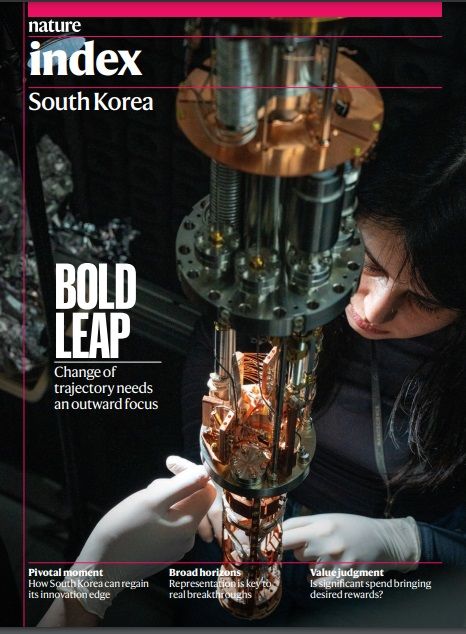Nature Index Publishes Korean Special Edition…Diagnosis of Challenges in Korean R&D
High R&D Investment and Researcher Ratio, but Actual Research Performance is Relatively Low
Highlighting Top 50 Research Institutions in Korea…Seoul National University, KAIST, Yonsei University Rank 1st to 3rd,

According to academia on the 21st, Nature Index compiled its latest issue as a special edition on Korea and diagnosed the challenges facing Korean R&D. (Photo=Provided by Springer Nature) *Reproduction and DB prohibited,
,
, “[Seoul=Newsis] Reporter Yoon Hyun-seong = The ‘Nature Index,’ which evaluates the academic capabilities of countries and universities worldwide, stated that Korea’s R&D (Research and Development) investment shows a noticeable presence among leading countries, but its achievements are considered insufficient compared to the investment.”,
,
, “According to academia on the 21st, Nature Index compiled its latest issue as a special edition on Korea and diagnosed the challenges facing Korean R&D. The Nature Index is operated by Springer Nature, which publishes one of the world’s top scientific journals, ‘Nature.'”,
,
, ‘In the preface of this Korean special edition, Beck Crew, Senior Editor of Nature Index, stated, “It is clear that Korea is investing significantly in science, with high researcher ratios per capita and higher R&D spending compared to other major countries. However, the research performance estimated by Nature Index is surprisingly low.”‘,
,
, ‘Regarding this, Beck Crew, Senior Editor, analyzed that Korea finds itself in a difficult situation due to some shake-ups in the relationship between industry and academia, as well as unfortunate events such as the world\’s lowest birth rate and declining student numbers.’,
,
, ‘In fact, looking at the statistics of Nature Index, Korea ranked high in R&D investment and human resources compared to leading countries in the R&D field.’,
,
, ‘In terms of human resources, Korea had the highest number of full-time researchers related to science and technology R&D per one million people as of 2021, with 9 researchers. Among the top 10 countries, Korea was the only Asian country. Following Korea, Sweden, Finland, Denmark, and Norway ranked high. Among Asian countries, Japan ranked second with a high ratio of R&D researchers.’,
,
, ‘The ratio of R&D investment to GDP was at around 4.9%, ranking second after Israel. Although research outcomes showed a decreasing trend from 2019 to 2023, they remained relatively stable at around 1%. Only five countries, including China, Luxembourg, and Denmark, showed an increase in research outcomes during the same period.’,
,
, ‘Despite Korea showing better performance than expected, it appeared to lag behind similar-level competing countries in actual research outcomes. Nature Index compared Korea with countries like France, Japan, India, Canada, and Switzerland at a similar level using Nature Index’s “Share” score.’,
,
, ‘The “Share” score represents the total contribution of a specific country or institution among papers published in major scientific journals worldwide according to the Nature Index. It can be seen as the “contribution score” of each country’s natural science research outcomes, reflecting indicators such as the number of papers and impact (citations).’,
,
, ‘Looking at the Share score, Japan scored around 3000 points and France around 2000 points, while Korea scored around 1500 points along with Canada, Switzerland, and India. Although Korea has higher R&D investment and human resource proportions than Japan or France, differences are evident in research paper outcomes.’,
,
, ‘Nature Index, along with this overview of Korea\’s R&D situation, also selected the top 50 research institutions in Korea based on Share scores.’,
,
, ‘As of last year, the highest-ranked domestic research institution was Seoul National University with a score of 217.26. The Share score increased by 4.3% compared to the previous year. Other institutions following were KAIST (164.37 points), Yonsei University (118.72 points), Sungkyunkwan University (109.84 points), Pohang University of Science and Technology (95.26 points), Institute for Basic Science (IBS, 80.56 points), and Korea University (79.34 points).’,
,
, ‘Beck Crew, Senior Editor, emphasized, “Korea’s strong investment in science and reputation for technological innovation are very impressive, but there is a need to address the mismatch between spending and performance,” and said, “By fostering more diverse international partnerships and enhancing the capacity of women in research, Korea can maximize the potential of the scientific community and solidify its position as a global scientific leader.”‘,
,
, “Meanwhile, Nature Portfolio will hold an ‘Index Live’ event related to Korea’s R&D in collaboration with KAIST on February 5 next year. At this event, experts in the field of science and technology will gather to discuss the topics introduced in this special edition of Korea in more depth.”,
,
,

